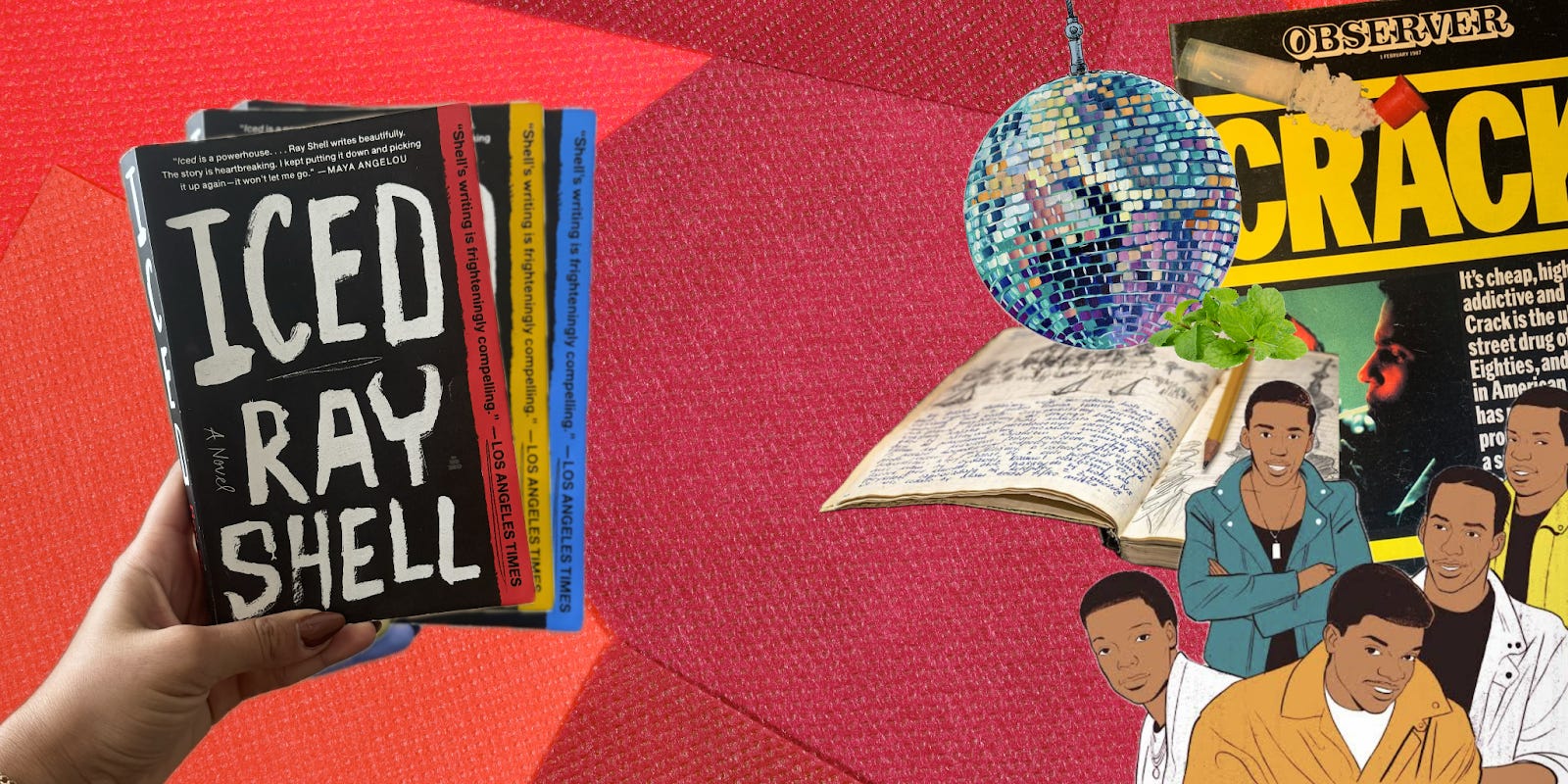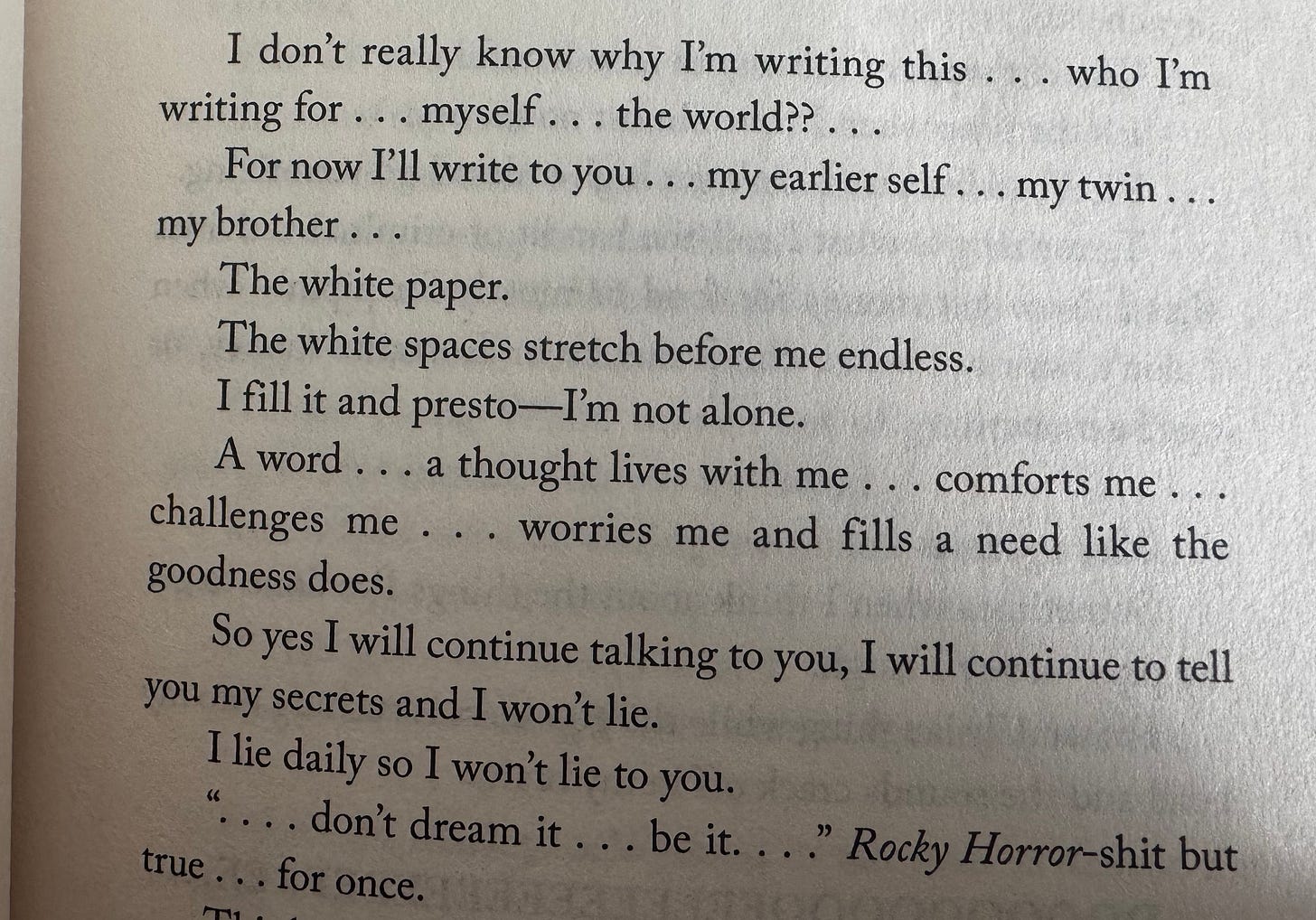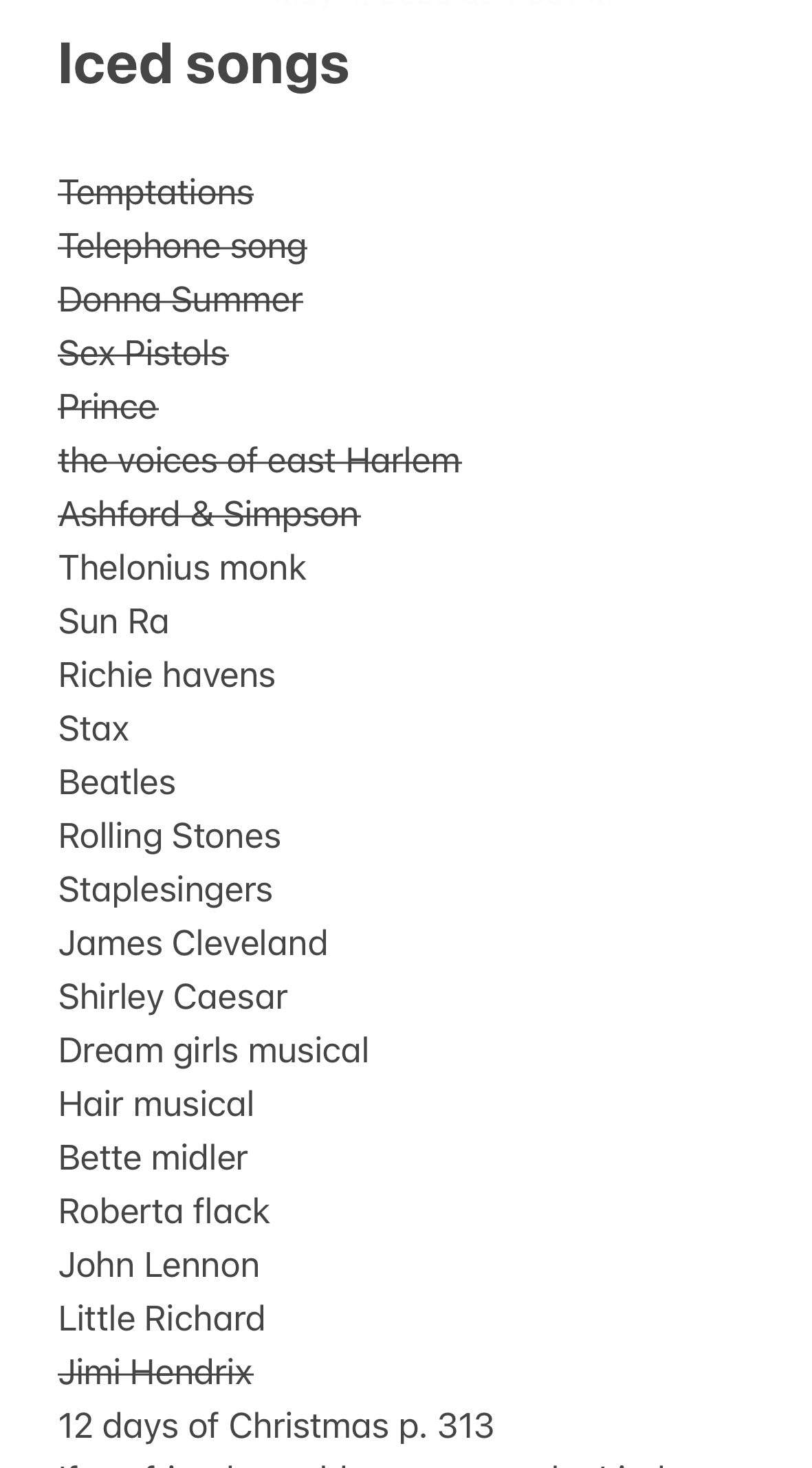Iced by Ray Shell – Book Review & Playlist
A gut-wrenching novel about addiction, memory, and loss—and the first piece of fiction I’ve finished in eight years. Spoilers (and music) ahead.
I was talking to someone last week about books we love. “What book changed the way you view yourself?” we took turns asking each other. “Black Skin, White Masks by Frantz Fanon,” I said. We laughed at the cliche of my answer. (I deserved that.)
“Iced by Ray Shell,” he said.
*adds to shopping cart.*
It was delivered to my door two days later.
When it did, I flipped the book over to read the description on the back cover:
First published at the height of the crack cocaine epidemic in 1993, this novel is as timely and relevant today as it was then. It is the story of Cornelius Washington, a young lower-middle-class Black man blessed with burning talent and ambition who enjoys experimenting with drugs—a dangerous pastime that gradually becomes a destructive addiction. Now a middle-aged crackhead, Cornelius ponders his life and the choices that have led him here.
YIKES. Not what I was expecting, but I’d give it a shot…
Without passing too much judgment, or googling reviews, I started to read. “Pipe this,” “pipe that,” “how can I get more pipe,” the main character, Cornelius Washington, wrote in the pages upon pages of stream-of-consciousness diary entries. He was referring to his addiction: the crack pipe.
Reading through the rage.
The first 40 pages filled me with rage. “What are we doing here? Do I have to read about this man’s pipe cravings for 300 more pages?!” I caught myself thinking before considering closing the book indefinitely.
I pushed through the rage to read another gut-wrenching 100 pages before settling into the book’s rhythm.
I’ve loved many people battling addiction over the years. It has the power to destroy a community, friendship, family… For that and a million other reasons, Ray Shell’s Iced felt like a fever dream.
Coming in and out of first-person journal entries, Cornelius toggles between his daily struggles to get and smoke (or not smoke) to feed his addiction, past escapades, despair-filled laments over the evolution of his community, and his shortcomings as a brother, son, and lover. All this occurs in the disco-meets-drug-party-culture in New York, Boston, and North Carolina. His cravings follow him to bath houses, basic training, recording studios, hospital rooms, abandoned houses, and local stores.
The format of journal entries felt eerily familiar to my own daily journaling practice. It is a space to clear my head, a landing place, one of the few listening ears that always greets me with warmth over judgement. Admissions of guilt here, explanations for hurtful behavior there–on each page, I felt one with Cornelius. He was not an innocent, but neither am I. It was intimate and terrifying.
The context of the 70s, 80s, and 90s– the decades that led Cornelius to his “sweet pipe”– flow into each other. The death of his brother, escapades in Boston as a producer’s legal council and strategic brain, decades of experimental drug use that occurred long before he ever tried crack, his culpability in several crimes and quasi-crimes, compounded the guilt and shame he carried into his addiction and spiraled into the book’s devastating climax.
The story is as much about the violence of the crack epidemic as it is about the failure of bureaucracy to catch everyone who slips through.
Where does addiction start? Is it born of unattended loss? Whose responsibility is it to care for those struggling? What happens when society pulls the very rug of escape from under an addict’s feet (shelter, therapy, support, etc.)? What even is an addict, if not a person?
My heart and body swirled with sympathy– or was it pity?
Did I mention this was the first book of fiction that I’ve managed to read cover to cover since starting graduate school? (That's 8 years, but who is counting?)
Iced was initially released in the 90s and then again in 2023 with a special Afterword by the author. (I have the 2023 version.) In terms of process, Shell stated that constructing character backstories as an actor helped him form the narrative for Iced. It shows. The inspiration for the tragic American tale came from even closer to home: witnessing Black elders and mentors lost to the silencing nature of the crack pipe.
Several stories combined into Cornelius’ life were based on real events, including the character of Eric. He was a drug-psychologist/therapist tasked with helping addicts on a path to recovery. After just his first interaction with Cornelius, Eric initiated a quid pro quo relationship with him to supply him with drugs in exchange for sexual favors. The dramatic betrayal of morality and justice is a running theme here.
This story is about crack, addiction, and desperation as a thief of knowledge, elders, and brilliance. It is about the bureaucratic topography of poverty and spaces constructed of hopelessness, desperation, failed lifelines, and alienation. It is about the humanness of struggle and the dozens impacted by one person’s decisions.
The Playlist
Having recently finished my dissertation (and hoping to transform it into a book), I’m constantly looking at how authors ground and contextualize their stories.
One of the most visceral ways Shell does this is through music.
On every other page, I was transported to a place and grounded in time by the library of musical references in Iced. While the character of Cornelius says his memory during the years of his addiction was shallow, his memory of the decades before is colorful and vivid. This is evident in the dozens of musicians and musical acts listed in the work.
I started writing them down when I realized a story about an up-and-coming band called the New Sensations in Iced seemed to mirror the story of the R&B group, New Edition. This was maybe halfway through the book, so I know there are so many I missed. The list remains long, and I plan to keep adding to it if I ever have the heart to reread this text.
In the meantime, if you plan to read Iced or you have read it and would like an experiential listen to the sounds of Shell/Cornelius, I made a playlist. It begins with - you guessed it- New Edition’s “Mr. Telephone Man” as a tribute to New Sensations’ “Telephone Song”. Take so much care while reading.
Iced is about crack, yes. It is also about addiction, desperation, and a system that disposes of Black brilliance far too easily.
It is about storytelling- how we think of ourselves in wreckages of our own creation, how we forget, and what remains in the aftermath of our decisions.
As a historian of loss and survival, I’ve learned that the stories we don’t preserve-including those about addiction, neglect, or care- can be the ones that shape entire communities. Iced makes those absences personal.
Have you read Iced or another book that made you rage, weep, or reflect like this? Drop your thoughts in the comments. I’d love to hear what stayed with you.






Thanks so much for this intensive review. Im grateful to how detailed this is. I'd love to send you LATERAL FLOW the sequel to ICED which tells how Cornelius becomes the European head of The Illuminati. My email address is streetangelsbooks@gmail.com
Thanks so much again.
Ray Shell